South Africa’s icon disappears, but her legacy endures
Translated and edited by Walter Lippmann for CubaNews
By Ilsa Rodriguez *
Pretoria (PL) South Africa said goodbye to Winnie Mandela, an icon of the anti-apartheid struggle, with tributes and posthumous awards culminating in a mass tribute in Johannesburg and funerals with the honors of a head of state.
She lives in all of us, in our actions, in guiding our struggles and remains in our consciences, said President Cyril Ramaphosa in his eulogy to tens of thousands of people gathered at Orlando Rugby Stadium in the Soweto neighborhood to pay tribute to her posthumously.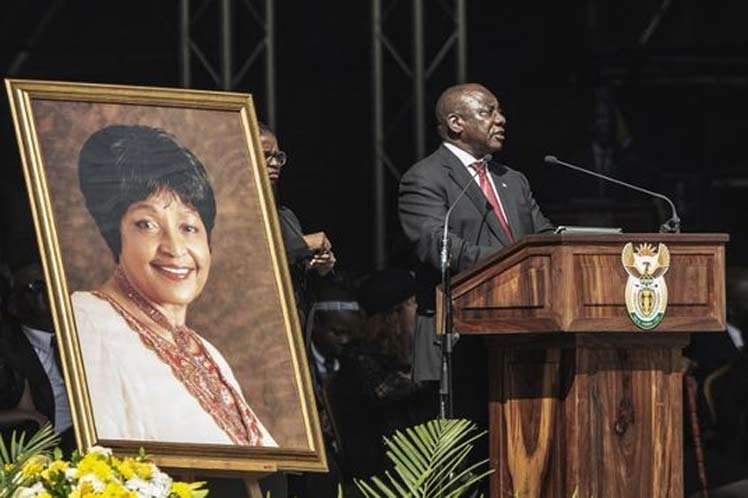
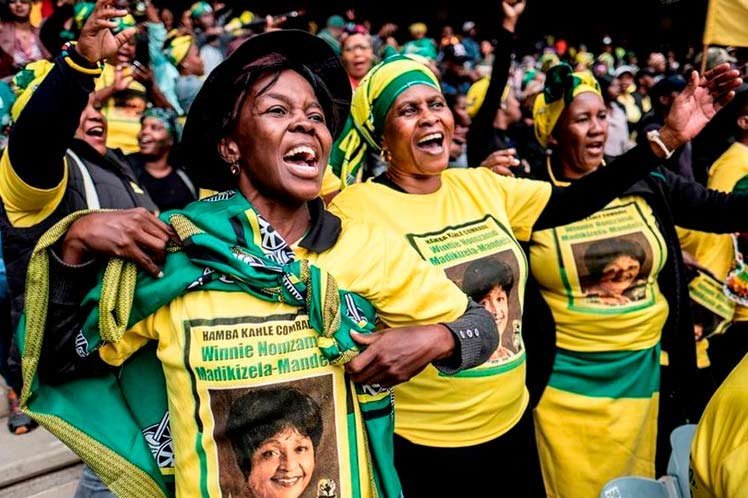 Nomzamo Winifred Madikizela Mandela, who was born in 1936 in Bizana, Eastern Cape Province, was an unwavering fighter against the regime of racial segregation.
Nomzamo Winifred Madikizela Mandela, who was born in 1936 in Bizana, Eastern Cape Province, was an unwavering fighter against the regime of racial segregation.
Because of her confrontation with segregation laws, protesting the repression and detention of African National Congress (ANC) combatants, including her then husband, Nelson Mandela, Winnie was tortured, imprisoned and isolated, and was the victim of a defamatory campaign organized for the security of apartheid.
The release for the first time in South Africa of an award-winning documentary about her life, made by the Frenchman Pascale Lamche, presented in the very voices of the perpetrators details of the so-called intelligence operation of the racial segregation regime (Operation Romulus) to defame this courageous woman, a symbol of resistance.
The inclusion in the national and international press of negative stories about Winnie, the pressures on the legendary leader Mandela, who was married to Winnie for 37 years, and other ANC leaders to separate from this indomitable woman recognized as the Mother of the Nation are told with great audacity by agents involved in these actions.
Through Lamche’s film, South Africans learned from the very voice of the apartheid security services exaggerated Vic McPherson that in 1989 he was in charge of a media strategy operation against Winnie and the ANC, and that he had 40 journalists to whom he provided false information to be published on the front page.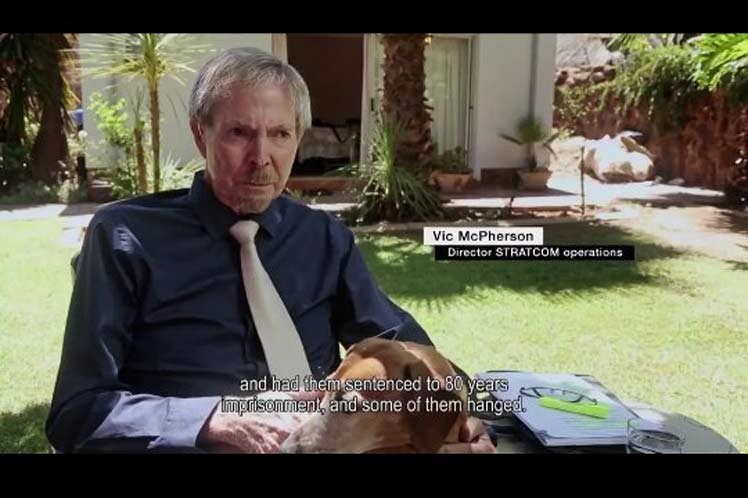
A particular impact had on the citizens of this country was that McPherson narrated these events sitting comfortably in his garden and petting his dogs, who considered the most chilling images of this documentary.
These and other revelations by several of the regime’s exaggers, including former Chief of Intelligence Niel Barnard and former Chief of Police in Soweto Henk Heslinga, brought new admiration in the nation for this woman, considered the face of South Africa during the dark years of repression.
DESERVED HOMAGE Tributes to Winnie, who died on April 2 at the age of 81 after a long illness, began the day after her death with official mourning, flags at half-mast and tributes throughout the country, which had their highest expression in the memorial on April 11, held at the Orlando District Stadium in Soweto. 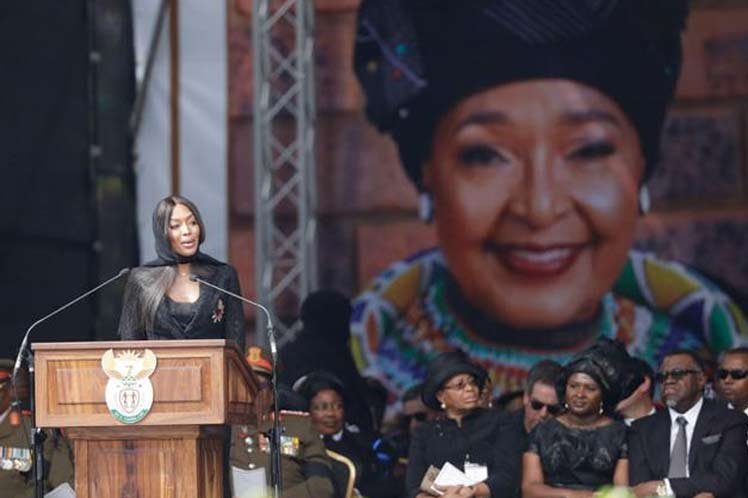
Songs and dances, part of the traditional liturgical ritual of South Africa’s black population, were a constant during the more than four hours of tributes led by Vice President David Mabuza.
In his words, the Vice President said that ‘we are here to mourn the death of a true revolutionary and leader of our liberation, to mourn the death of the Mother of the Nation because a tree that protected us has fallen’.
Mabuza, also vice president of the ANC, said Winnie remained relentless until the last years of her life and throughout her life’you reminded our daughters and mothers that women are powerful and can stand up to men’.
A similar ceremony, convened by Julius Malema’s opposition Economic Independence Fighters (EFF) party, took place on the same day in the Free State province.
TRIBUTES Analysts in South Africa consider that one of the most heartfelt tributes was that of Mandela’s widow, Graca Machel, who dedicated a letter to’her elder sister’ where she says that’you have become one of the brightest stars in the sky, where you will remain forever radiant’.
The extraordinary life you led is an example of great strength and inexhaustible passion, a source of inspiration for all of us on how to face challenges with courage, firmness and unwavering determination…. Thank you for your brilliant wisdom, fierce challenge and elegant beauty’, Graca Machel’s message expressed.
Government and political leaders from various organizations, including the Communist Party, the EFF, the Inkatha Party, and the ANC youth and women’s leagues, among many other voices, expressed their admiration, respect and appreciation for Winnie Mandela’s years of selfless struggle for South Africa’s liberation from apartheid. In the final farewell to Winnie, President Ramaphosa said that her life was dedicated to the unity of the oppressed of all nations and in death ‘unites us all, those close to her and those from many nations and continents, to pay homage and remember her with affection’.
She has shown in her death that our many political and racial differences have been overshadowed by our shared desire to follow her example in building a just, equitable and caring society, she said. The president said Winnie’s conscience and convictions left her no choice but to resist because’she felt forced to join a noble struggle in her purposes, though dangerous to carry out, to speak out when others were silent, to organize, mobilize and lead when those who did were imprisoned or forced into exile. 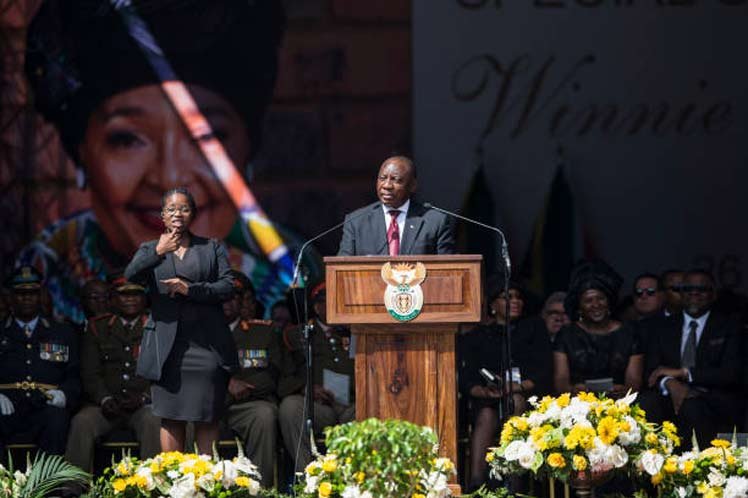
He recognized that she lived, like many South Africans, with fear, pain, loss and disappointment, but each day she rose up with the nobility of the human spirit… They tried to denigrate her with bitter, twisted lies…. they wanted to destroy her so that she would lower her eyes and show weakness, but she always stood up.
President Ramaphosa admitted in his eulogy that’we are forced to acknowledge that she often stood up alone….too many times we were not there for her’.
All who appreciated her and recognized her dedication promised to follow her example and fulfill her legacy.
arb/ir
Prensa Latina Correspondent in South Africa.

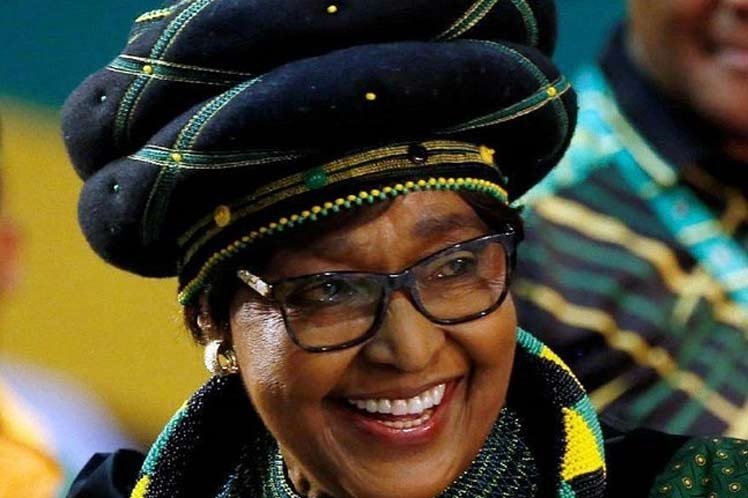
You must be logged in to post a comment.